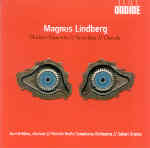Magnus Lindberg’s Clarinet Concerto is just fabulous, perhaps the finest work he has written, and certainly one of the tiny handful of truly great pieces in the medium. My colleague, Victor Carr Jr telephoned after listening to the piece at my urging and said, “Remember how when we were in high school and the prospect of a new work was something that everyone dreaded?” Times have changed, and if there’s still lots out there worth dreading, there are also gems like this one, waiting to be discovered, proving conclusively that Classical Music is not dead, and may even (perish the thought) be thriving. Certainly this is the case in Finland, where clarinetist Kari Kriikku has inspired a number of fine works. Indeed, 2005 may just be “the year of the Finnish clarinet concerto”, what with Rautavaara’s fine new entry making it onto disc, also courtesy of Ondine.
The most wonderful thing about this 25-minute single-movement piece is that Lindberg manages to retain his characteristic layering techniques and exploitation of tonal mass, while creating ideas that are beautiful in a traditional sense, glitteringly scored, and easy for the listener to follow. Various sections of the orchestra are “personalized” by being given their own special material (an arresting, rising motive in the brass is especially prominent), while the actual main theme, reappearing at critical points somewhat in the manner of the trombone tune in Sibelius’ Seventh Symphony, is a lush, cinematic melody that lingers in the memory long after the work ends. No matter how dense the textures, the scoring never overbalances the clarinet, which functions very much as first among equals. There’s so much variety and ear-catching contrast, and this performance is so magical in its freedom of expression and effortless virtuosity, that it wouldn’t surprise me if you played the work straight through twice at a sitting. It’s that good.
Gran Duo, scored for an ensemble of 11 brass and 13 woodwinds, is less melodically ingratiating, but certainly not aggressively difficult. Here the point is the interplay of brass and woodwind sonorities, and Lindberg admirably sustains the tension with a fascinating variety of shifting textures throughout the piece’s 20 minutes. One of the marks of a master orchestrator is his ability to create new sounds using standard or even restricted instrumental forces. Lindberg certainly does that here, without ever raising the suspicion that he is making noise for its own sake. This quality is similarly evident in Chorale, for strings and woodwinds, a sharply compressed gloss on “Es ist genug”, the same tune (in Bach’s setting) that appears in the second movement of Berg’s Violin Concerto. Bits of the theme surface in the variously layered instrumental voices along the way to a radiant conclusion. All of the performances under Sakari Oramo are just plain stunning, and so is the sound. What a terrific disc! [10/24/2005]
































